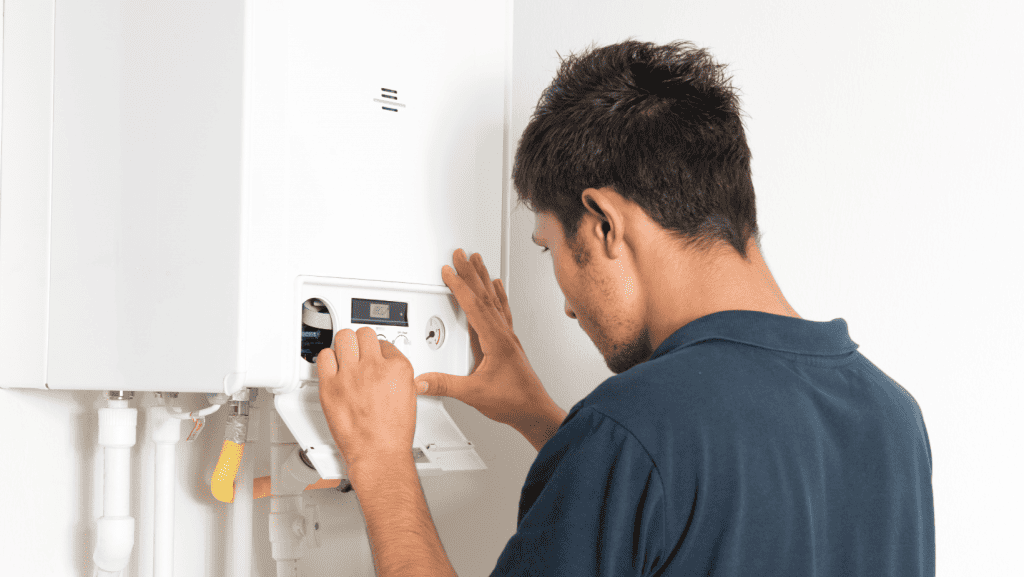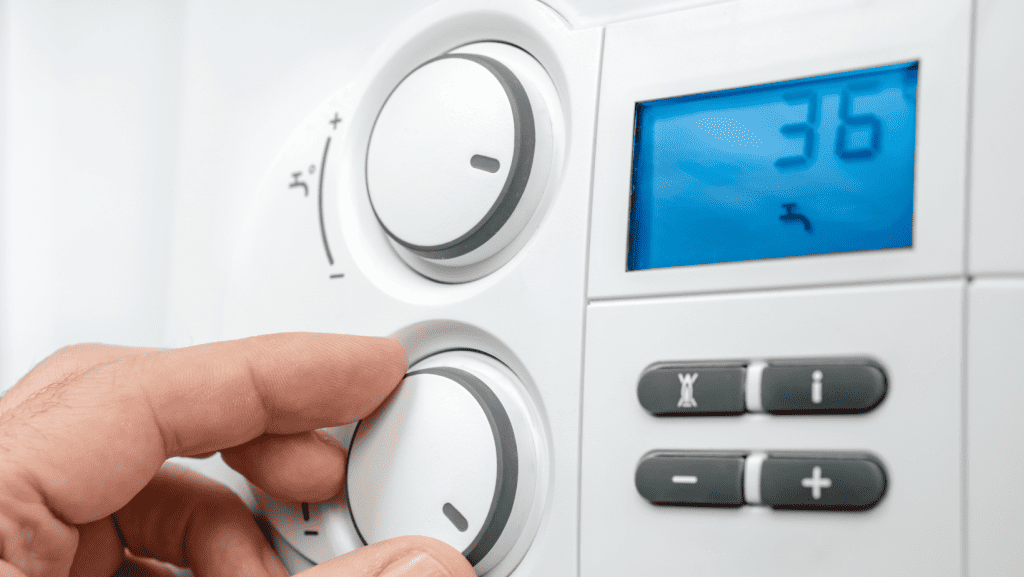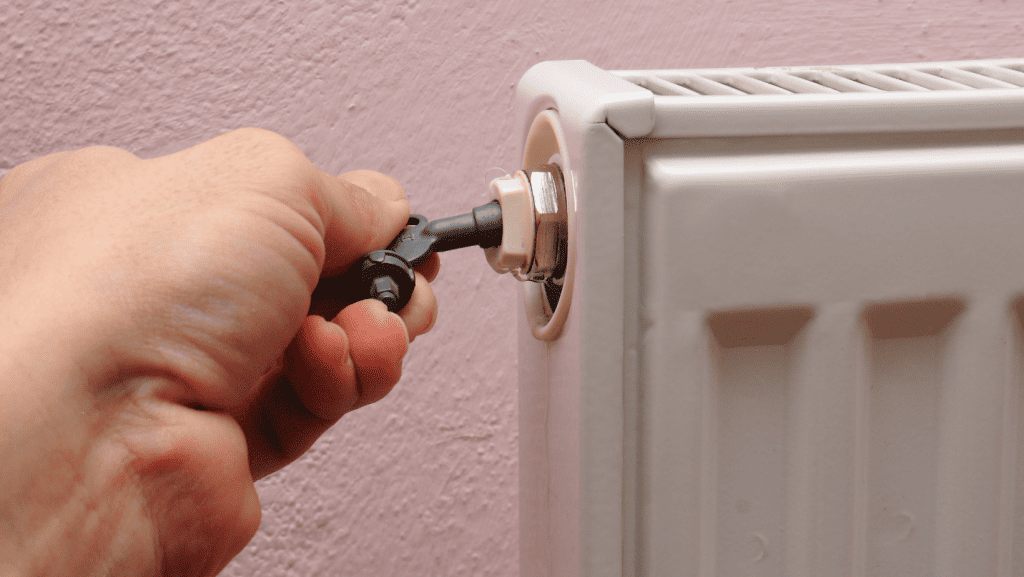Amid a cold winter, the last question you want to ask yourself is, “Why is my boiler making a loud vibrating noise?”
The fact of the matter is, any unusual sound your boiler makes isn’t good news.
Noises like gurgling, whistling, humming or vibrating could all indicate something amiss. This article will tell you what the potential cause could be.
I spent several of my younger years training as a plumber. During winter, boilers were the most common call-out for me.
I’d spend hours triaging faulty boilers and giving homeowners the inevitable bad news.
I got called out for the same old question, “Why is my boiler making a loud vibrating noise?” Here is what i’ve learnt.
Table of Contents

Some Potential Common Explanations…
Here are a few common potential reasons why your boiler is making a loud vibrating noise. Lets go through them.
Loose Boiler Case
That vibrating boiler noise could be a loose case. Over time, screws and metal can become loose and worn. When your boiler tries to heat up, it might make a vibrating noise.
The best way to check this is to put your hand on the case of the boiler when it’s making the sound. If the vibrations stop, then you may have a loose screw which can be tightened.
A System Vibration
If the vibration noise is coming from the system and not the case, it could be coming from the system itself. The most common causes of system vibration could be a faulty circulation pump or a blocked pipe.
If your pump is faulty, don’t worry. Water will still move through the boiler system but will be much slower.
Your heating will take longer to heat up. This is how you know you have a faulty pump and need a professional.
Condensate Pipe
If your condensate pipe is blocked, you’ll also hear a gurgling sound when your boiler starts. You’ll find your condensate pipe leaving your home at the nearest outside wall.
This could be frozen, so you can attempt to unblock this yourself, pouring warm (not boiling) water on the pipe so the ice melts. If this doesn’t stop the sounds, it’s time to call a professional.
If you suspect that the gas valve, the flu or the boiler fan is causing the vibrating noise, then you have no choice but to call a professional.
Low Pressure
The loud vibrating noise could be down to low pressure. You can top the pressure up by opening the pressure valves on the bottom of your boiler and adjusting it to the desired pressure.
Trapped Air
If air gets trapped in your boiler system and mixes with water, it can cause your boiler to vibrate and also make gurgling sounds. The quickest resolution is to bleed your radiators to release the trapped air from the system.
Creaking Pipes
Over time, pipes can come loose and move when hot water flows through them. This can cause a banging noise that may echo throughout the system and make it sound like it’s coming from the boiler.
Although this can be rare, it’s best to check any pipework exposed in your home to rule this out before you call a heating engineer.
Limescale Buildup
If you live in a hard water area, limescale buildup could be the culprit behind your boiler’s strange noises.
Limescale has been known to accumulate on the heat exchanger, causing the boiler to overheat and generate steam. This process, known as “kettling”, can result in a vibrating and whistling sound.
A heating engineer must flush the system to remove the limescale and restore your boiler to quiet operation.
Lack Of Adaptive Pump/Auto bypass Valve
A technical issue with the adaptive pump or auto bypass valve can cause a loud vibrating noise in your boiler.
Suppose the pump is malfunctioning or running too fast. In that case, the heated water will move too quickly around the pipework, leading to loud vibrations.
Similarly, a faulty auto bypass valve can lead to high pressure in the system, causing a loud noise.
There isn’t much you can do in either case, and you will need a heating engineer to look at your system.
Radiator Heads
Sometimes, the issue might be with something other than the boiler. If the radiator heads are turned off, it can cause a buildup of pressure in the system, resulting in a loud vibrating noise.
Make sure to check all the radiators in your home and ensure that they are switched on.

Understanding Boiler Noise
It’s good to understand that not all boiler noises indicate a problem. Some sounds are part of the regular operation of the boiler and the central heating system.
But when a boiler starts making strange, out-of-the-ordinary noises, it’s time to pay attention.
These noises can range from gurgling and humming to banging and whistling.
Each sound can indicate a different issue, so it’s important to identify the type of noise your boiler makes.
My Boiler Is Gurgling
If you hear gurgling sounds, it means there’s air trapped in the system, mixing with the water. While it’s not usually a big issue, it’s a good idea to fix it pronto. The easiest way? Bleed your radiators.
My boiler Is whistling (kettling)?
Though kettling can produce a whistle, it can also result from trapped air in the system. Releasing the air is a speedy fix,
Mechanical issues, such as pumps needing oiling, may also contribute, leading to squeaks or whistles. Trust your engineer to handle the necessary repairs.
My Boiler Is Buzzing
If you hear a buzzing or whining noise emanating from your boiler, it’s a legitimate reason for concern.
This is often due to worn pump bearings, vibrating fan bearings, or a faulty burner. Regrettably, these issues require the expertise of a qualified professional.
My Boiler Is Humming
Humming can occur when water from the mains enters at excessive pressure. This can result in humming valves within the boiler or around the home’s pipes.
A humming noise may arise from the pump circulating heated water too quickly through the pipes. The bearings in the boiler fan humming during movement could also be the issue.
A noisy boiler can be annoying. However, it’s important to remember that it’s often a symptom of an underlying issue, not a problem.
It’s always a good idea to investigate the noise source and aim to fix the root cause rather than treat the symptom. Ignoring these noises can lead to more serious (and expensive) problems down the line.
This could be a boiler breakdown and damage to other components of your heating system.

Preventive Measures You Can Take
There are a few home remedies you can do and check regularly to ensure your boiler is in tip-top condition. If you need clarification, consult a professional before touching your boiler.
Preventing Boiler Breakdowns
The best way to prevent boiler breakdowns is to book regular maintenance appointments yearly.
This involves a gas-safe engineer attending your home. They will complete tasks such as checking the boiler pressure and cleaning the magnetic filter.
Regular maintenance helps identify problems early, avoiding unexpected costs and surprises. It ensures your boiler runs efficiently without any surprises.
Regularly Check the Flow of Water
Ensuring a steady water flow in your boiler certainly helps for efficient operation. Low water pressure can cause your boiler to work harder, leading to wear and tear and potential issues.
Checking the water pressure regularly helps maintain boiler efficiency. Topping up when needed is also essential for optimal performance.
Bleed & Balance the System
Bleeding or balancing your central heating system is the best way to remove air from the pipework and ensure your heating works. This should be done every year so your radiators are in a good state and ready for the cold winter months.
Check For a Boiler Error Code
Your boiler will spit out an error code if something isn’t working or it’s not doing what it should be. This will be shown on the display on the front of your boiler. You can get this code and check your boiler manual to see what it means.
Check Your Boiler Manual
Always consult the manufacturer manual regarding error codes and general maintenance. If you need to get your error code, visit freeboilermanuals.com. There, you can enter your boiler details and download the manual.
Dealing with Strange Noises
If your boiler makes strange noises, it’s best not to panic. Start by identifying the type of noise and its possible cause.
There are simple fixes like bleeding the radiators or checking the water pressure that can make a strange noise stop at a moment’s notice.
If the noise persists, calling a professional is always a good idea. Ignoring banging or gurgling noises can cause more significant problems later. Addressing them sooner is always better to prevent serious issues.
Ignoring boiler noises can lead to costly repairs or even a complete boiler replacement.
A noisy boiler is often a sign of an underlying issue that needs fixing. By addressing these noises promptly, you can avoid more severe problems and save money in the long run.
Safety first
No matter what you do, safety should be at the forefront of your mind when dealing with your boiler. Your home boiler is a complex beast, and there are reasons why specialist engineers come out to maintain them.
Never ever take matters into your own hands and start dismantling your boiler. Always call a professional if you need clarification on something.

FAQs
This section will address common questions about boilers and the noises they produce.
Boilers may produce a loud vibrating sound due to different factors. These factors include air in the system, limescale buildup, or problems with the circulating pump.
Air pockets can cause vibrations. The limescale on the heat exchanger can create uneven heating, causing noise. Regular maintenance and bleeding of the system can help alleviate these issues.
If your boiler generates a loud noise, it’s crucial to address the issue promptly. Start by checking for any visible issues, like leaks or loose components.
Bleeding the radiators can remove air pockets and fix the issue. Checking the water pressure is also necessary to resolve the problem. If the noise persists, seeking professional assistance for a thorough inspection is advisable.
While a noisy boiler can be unsettling, it doesn’t necessarily mean it’s unsafe. However, it’s crucial to investigate the noise source to rule out potential issues.
Some common causes, like air in the system or limescale buildup, can be resolved with simple maintenance. If you need clarification or other issues, consult a qualified technician. They can thoroughly inspect and diagnose the problem.
Fixing a vibrating boiler involves identifying and addressing the root cause of the vibration. Begin by checking for loose components, such as pipes or panels, and tighten or secure them as needed.
Bleeding the system removes air pockets. Descaling the heat exchanger mitigates vibrations caused by limescale buildup.
Consult a professional technician if the issue persists. They will conduct a thorough examination.
A broken boiler may emit various sounds, indicating different issues. Common problem noises include banging, whistling, or gurgling sounds.
Banging can result from kettling, a limescale buildup in the heat exchanger. Whistling may indicate issues with the pressure relief valve while gurgling sounds might be due to trapped air.
Promptly investigate any unusual sounds. These sounds may indicate underlying problems that require attention from a qualified technician.
Boiler noises like banging, whistling, or gurgling may indicate various issues. Persistent or loud noises may indicate system issues like air or limescale buildup. A malfunctioning pump could also be the cause.
If you hear strange sounds or notice decreased performance, consult a professional. They can assess and fix any potential problems.
A boiler leak may produce a distinct hissing or dripping sound. If you hear such sounds near your boiler, it’s crucial to investigate promptly.
Leaks can lead to water damage and compromise the efficiency of your heating system. Regularly inspect the boiler for visible water signs. Call a qualified technician to fix the leak and avoid more damage if you find any.
If your boiler is kettling, resembling the sound of a boiling kettle, it could be due to limescale buildup in the heat exchanger.
Kettling poses no immediate danger, but turn off the boiler. Seek professional help for assistance.
Ignoring kettling could lead to reduced efficiency and potential damage to the system. A technician can address the underlying causes for optimal performance.
The Bottom Line
The question “Why is my boiler making a loud vibrating noise?” can have different causes. It could be a loose component or a more severe problem.
If you need help with something, switch off your boiler. Call a professional immediately if you are concerned about safety. If you feel uneasy with the noise, switch off the boiler.
Sometimes, bleeding the system or checking the water flow are significant first steps to stop that pesky noise. Give it a go, and hopefully, any further vibrating or gurgling noises will soon be a thing of the past!
Why Is My Boiler Making a Loud Vibrating Noise?
Thank you for reading our article on Why is my boiler making a loud vibrating noise? If this has been useful, please check out our blog HERE, for more DIY tips and advice, tailored for Dads maintaining their home.






